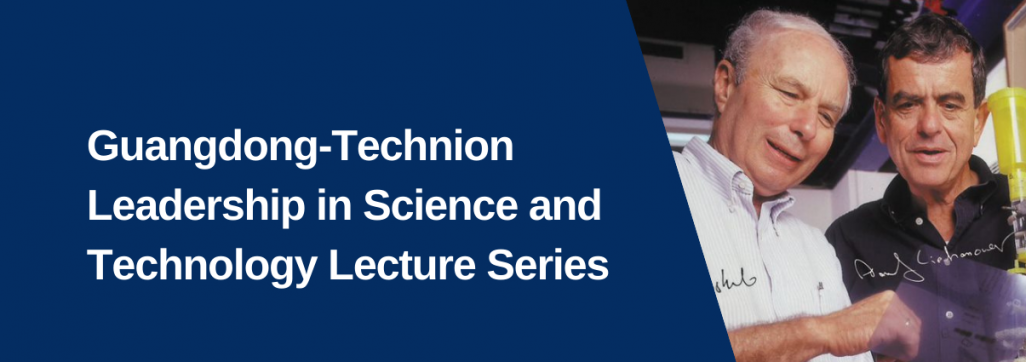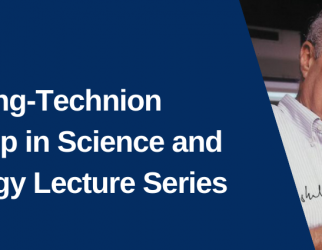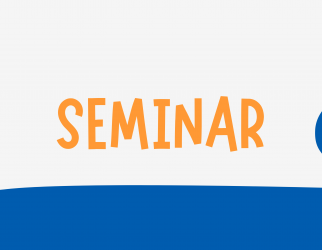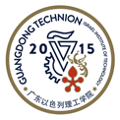
Guangdong-Technion Leadership in Science and Technology Lecture-Prof. Gregory Stephanopoulos-MIT
Title
Biotechnology for Fun and Profit 生物技术,寓教于乐,寓教于利
Speaker
Gregory Stephanopoulos
W.H. Dow Professor of Chemical Engineering and Biotechnology
Massachusetts Institute of Technology (MIT)
Host
Prof. Peng Xu (GTIIT ChE)
Date & Time
Jun. 08 2022, Wednesday, 7:00-8:00 AM (Boston Time), 2:00-3:00 PM (Israel Time), 7:00 – 8:00 PM (Beijing Time)
Venue
E308 (Education Building, 3rd floor)
Language
English(Simultaneous interpretation will be available)
How to join:
Scan the QR code or click here to join the lecture
Note: New users should download the zoom app on the mobile phone

Free snacks will be provided at 6:40 pm (Beijing Time).
Abstract
Biotechnology is rapidly coming of age as enabling technology for the production of biofuels and biobased chemicals. In this task, it is aided by critical advances in Metabolic Engineering that engineers microbes into little chemical factories capable of converting renewable feedstocks to a variety of products. While in earlier years this application was limited to specialized chemicals and pharmaceutical products, recent advances in metabolic engineering and synthetic biology have expanded the portfolio of biotechnological applications beyond specialty products and into the domain of commodity chemicals. As the latter have been traditionally the realm of the chemical process industry using fossil fuels as feedstocks, we are witnessing a process of creative destruction whereby one manufacturing technology based on chemistry is gradually being replaced by another based on biology. Process and product sustainability is a major driver of this development.
Engineering microbes, however, for real industrial applications requires more than just the assembly of the genes comprising a biosynthetic pathway. The capacity of the pathway must be assessed vis-a-vis alternative routes, along with its thermodynamics and kinetic bottlenecks, and its performance in bioreactor environments evaluated. In this context, alternative feedstocks should be evaluated to identify the one that can be fully utilized for the production of the target product with minimal byproduct formation. These concepts and tools constitute the essence of metabolic engineering as will be illustrated in this talk with an example from the engineering of oleaginous yeast for lipid (biodiesel) and alkane production. In another example, the synthesis of isoprenoid products used as flavors, fragrances, vitamins and pharmaceuticals will be presented. I will then expand on the parameters that will define the winners and losers of the antagonism between chemistry and biotechnology ultimately leading to efficient processes for the sustainable manufacturing of fuels and chemical products.
Bio

Greg Stephanopoulos is the W.H. Dow Professor of Chemical Engineering and Biotechnology at MIT, and Instructor of Bioengineering at Harvard Medical School (1997-). He received his BS from the National Technical University of Athens, MS degree from the U. of Florida and PhD from the U. of Minnesota, all in Chemical Engineering. He taught at Caltech between 1978-85, after which he was appointed Professor of ChE at MIT. His current research focuses on metabolic engineering, the engineering of microbes for the production of fuels and chemicals. He has co-authored or –edited 5 books, more than 425 papers and 55 patents and supervised more than 130 graduate and post-doctoral students. He co-founded the journal Metabolic Engineering, and is presently co-editor-in chief of Current Opinion in Biotechnology. He serves on the Editorial Boards of 10 scientific journals and the Advisory Boards of 5 ChE departments. For his research and educational contributions, Prof. Stephanopoulos has been recognized with numerous awards, such as: Dreyfus award, Excellence in Teaching Award-Caltech, AIChE Technical Achievement Award, PYI from NSF, AIChE-FPBE Division Award, Marvin Johnson Award of ACS, Merck Award in Metabolic Engineering, the R.H. Wilhelm Award in Chemical Reaction Engineering of AIChE, Amgen Award in Biochemical Engineering. In 2003 he was elected to the National Academy of Engineering (NAE) and in 2005 he was awarded an honorary doctorate degree (doctor technices honoris causa) by the Technical University of Denmark. In 2007 he won the C. Thom Award from SIM and the Founders Award from AIChE and in 2010 the ACS E. V. Murphree Award in Industrial and Engineering Chemistry and the George Washington Carver Award of BIO. In 2011 he was selected as the Eni Prize winner for Renewable and non-Conventional Energy and was also elected as Corresponding Member of the Academy of Athens. He is a ASSS and AIChE Fellow. He was the 2014 recipient of the 2014 Walker award from AIChE. In 2013 he was awarded the John Fritz Medal of the American Association of Engineering Societies, in 2016 he won the Eric and Sheila Samson $1 Prime Minister Prize (Israel) and was awarded an honorary doctorate by the Technical University of Athens and in 2017 we was recognized with the Novozymes Prize. Professor Stephanopoulos has served the professional organization of Chemical Engineers as chairman of Division 15, member of the Board of Directors and Chairman of the AIChE Society for Biological Engineering. In 2014, he was elected as 2016 President of AIChE.
Professor Stephanopoulos has taught undergraduate and graduate courses of the core of Chemical Engineering and Biotechnology at Caltech and MIT and co-authored the first textbook on Metabolic Engineering. He is presently directing a research group of approximately 15 researchers who work on applications of metabolic engineering for the production of natural products, fuels and chemicals.
Speaker
-
Gregory Stephanopoulos
Local Time
- Timezone: America/New_York
- Date: 08 Jun 2022
- Time: 7:00 am - 8:00 am



